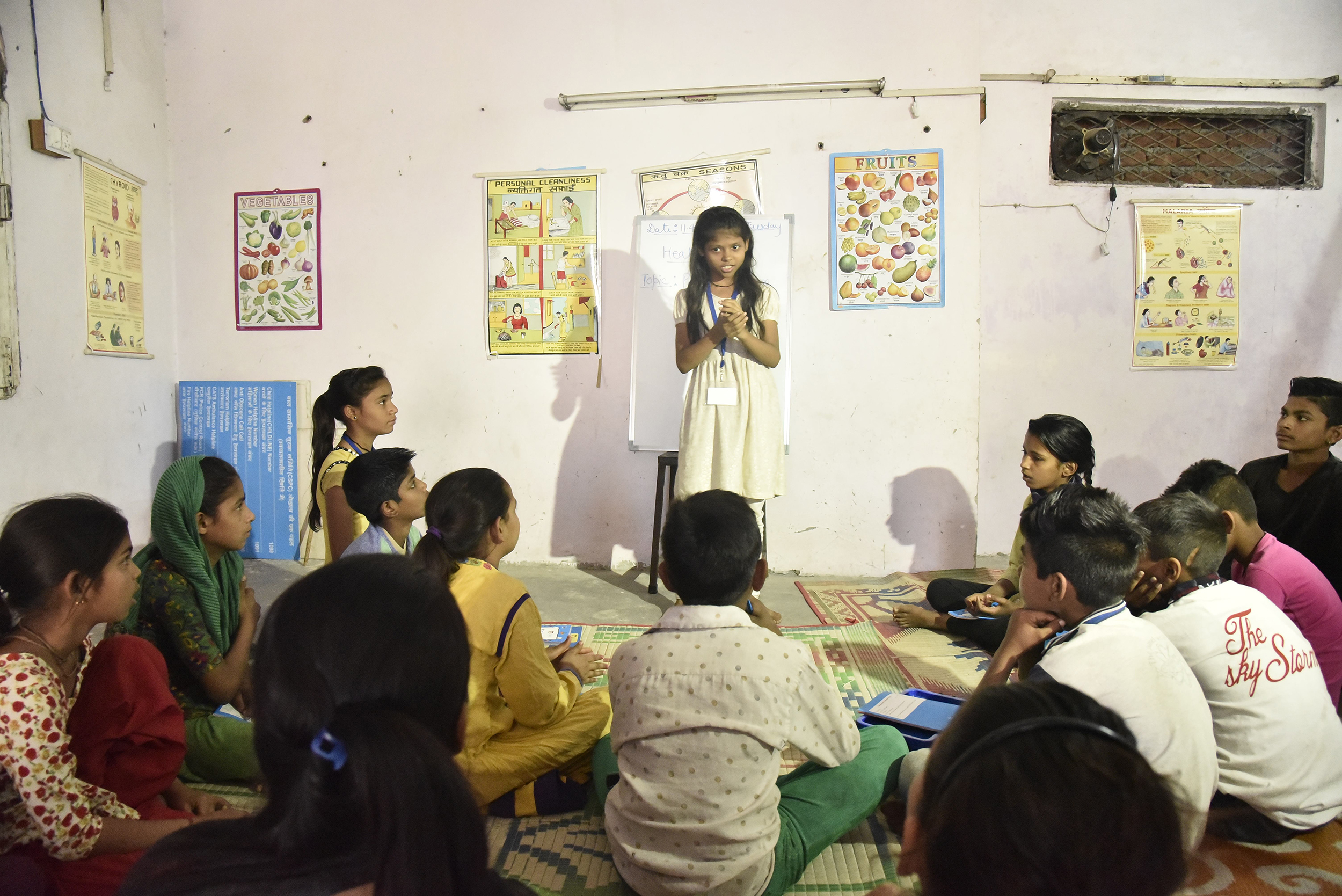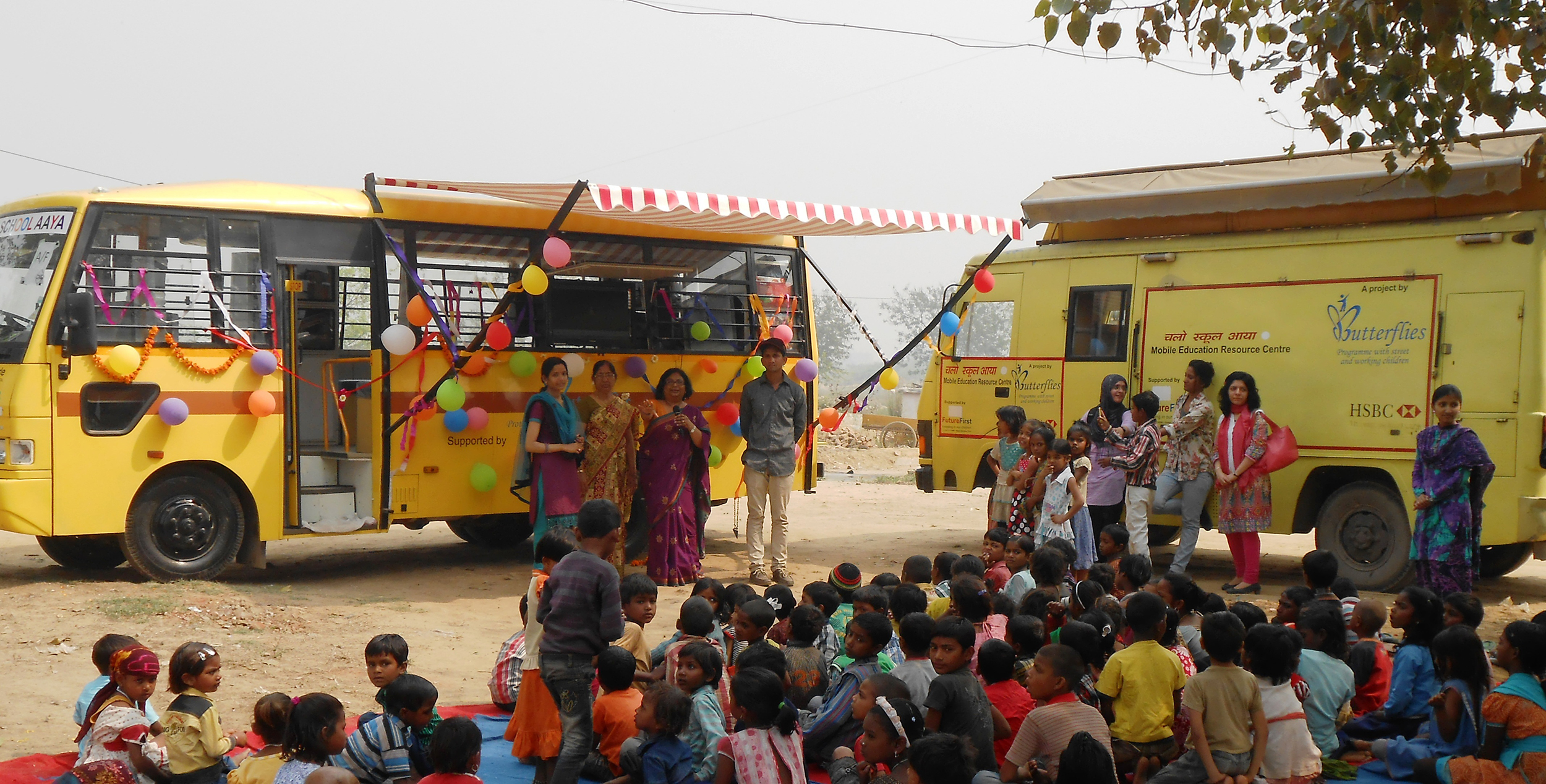Butterflies’ Philosophy at Work

“A butterfly is one of nature’s most beautiful creatures; so is a child. Butterflies have very short lives; our children have very short childhoods.” – Rita Panicker, Founding Director, Butterflies
Rita Panicker loves to recount the epiphany that she had in the very early days of working with vulnerable children. Her team of five street educators championed the concept of children’s right to develop a voice and participate fully in decisions that impacted them, but it took a seminal incident to make them all realize that they were not ‘putting their money where their mouths were’. It was a lesson that they have never forgotten.
As the festival of Diwali approached in October 1988 and a celebratory atmosphere enveloped the city, the street educators decided that they would gather the underprivileged kids in Delhi’s Central Park for their very own fireworks display capped by a feast of sweets. Imagine the chagrin of these well-intentioned adults when they shared their plans – which they were quite sure would delight. Instead, their sensible charges questioned the decision to waste money on these trifles. With winter coming, the children said that they would rather save these funds to buy sweaters and other warm woolen clothes. And Butterflies listened.
Fast forward 35 years. This humbling experience gave birth to principles at the core of Butterflies’ philosophy and approach: Listen closely to children. Amplify their voices. Ensure children’s active participation in democratic decision-making. Help them see that their rights entail responsibility.
These principles inform Butterflies’ programming and lead to children’s empowerment.

Children’s participation is a core value of Butterflies. We ensure that there is children’s participation in two ways.
Bal Sabha
Bal Sabha or the Children’s Council forms the soul of Butterflies program. The objective is to provide a platform for children to meet, discuss, share their ideas and decide on issues concerning them. Small Bal Sabhas are conducted in all contact points every fortnight while the Big Bal Sabha are conducted every month in which child representatives from all the contact points come together to discuss their issues, analyze on-going activities as well as plan future activities. The Bal Sabha’s gives children the opportunity to learn the principles of democracy, i.e., every person has a right to an opinion and freedom of expression, a consensus must be reached to take a final decision and that sometimes a compromise is needed.
The Bal Sabha is also a space for children to comment or critique the programmes or policies of Butterflies, apart from also discussing social, economic and political issues that are impacting their lives or lives of other children.
Bal Samiti
One child representative from each contact point meets with the Director of Butterflies every six months. It provides a platform to the children to apprise the Director of the situation in the contact points and also share their issues and concerns.
The Bal Sabha and Bal Samiti meetings give us directions to introspect, make adjustments or make decisions in the interest of the children.

The most powerful, sustained outcome of Butterflies children’s councils is the Delhi Child Rights Club (DCRC), launched – most fittingly – on Human Rights Day, December 10th, 1998. Adults had failed to protect vulnerable children’s right, so children took it upon themselves to ensure action.
Butterflies helped to amplify their voices. It convened 13 peer organizations working with Delhi’s street connected kids to create a DSCG core group with 3 elected child representatives and 1 adult facilitator from each NGO. The result is a citywide forum that enables children’s input into municipal policies that make for a more child-safe and friendly city.
DCRC members prepare their Annual Program Calendar at the start of each year, meeting monthly to plan and execute activities using a blend of formats: discussion, workshops, drama, songs, a bi-monthly newsletter, and games. For 25+ years, the DCRC has undertaken actions such as awareness campaigns on the rise of missing children, rallies protesting unsafe working conditions, and street theater dramatizing harassment by the police and shopkeepers. DCRC members also conduct studies and surveys on issues such as sanitation that impact their communities, which they share with decision-makers and the media.
Beyond the core principle of children’s full participation, there are other aspects of the Butterflies philosophy that have attracted supporters for 30+ years: its commitment to a non-institutional approach and its belief that rights entail responsibility.
Butterflies does not follow the popularly accepted approach of institutionalizing street kids, children whose family may be in crisis, or working youth living independently. Instead, Butterflies makes every effort to identify families, help with a child’s or youth’s re-integration with the family, and support the family both with temporary short term assistance and with longer-term social casework therapy to strengthen the family unit. Butterflies staff visit the family wherever they are sheltering and help them to apply for formal government assistance and social services.
Butterflies believes that it is the strong family unit that provides children with their roots, values, traditions, and longer term emotional, caring support.
Butterflies may not run formal institutional schools but its Child Rights Advocates do all in their power to reach out to unschooled children and enroll them in formal state schools, providing supplementary learning support and enrichment via its cooperative learning pods, mobile school, and street education support at contact points. Butterflies enroll working youth who have not been to school in the National Institute of Open Schooling and work along side these young people to ensure that they complete the requirements for secondary school certification followed by vocational training.
In late 2021 while the formal state primary school buildings remained closed, Butterflies was able to provide nutrition, learning, and emotional support to children at its 8 open air contact points. This has played a key role in preventing more widespread malnutrition and cognitive deficits.
Learn more.
Butterflies formally ascribes to children’s rights as defined in the Constitution of India and the UN Commission on the Rights of the Child.
What strikes us at Butterflies USA is the remarkable ‘give back’ spirit behind the letter of ‘children’s rights’.
An incident we heard about three years ago, pre-COVID, captures, we think, the notion that a street-connected ‘Butterfly ‘acts for the common good. The Adobe corporation in Delhi sponsored an employee volunteer day to which a dozen Butterflies’ cooperative kids were invited. These boys and girls spent the better part of a Saturday assembling state of the art bicycles with the help of the Adobe team. At the end of the build it together session, the corporate volunteers expected that each child participant would claim his or her bike. Not so. In an informal bal sabha or children’s council, the decision was made to own, store, service and maintain the bikes communally so that many many more than the dozen ‘makers’ could reap the rewards of the day.
Read any Story of Change from Butterflies NGO and one is struck that street connected children of all ages not only grow in self reliance; they apparently can hardly wait to share the information they’ve gleaned, and the life skills that they have honed, and in the case above, the gifts that they have received first with peers, then with their extended family and next with the wider community.
Like an eddying pool, this core Butterlies’ principle of acting for the greater good has a marvelous ripple effect.
Marginalized communities are gradually invigorated by the collective action of enlightened youth — a first step towards breaking the cycle of intergenerational poverty.
